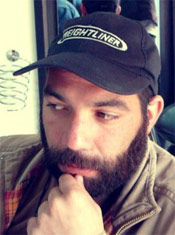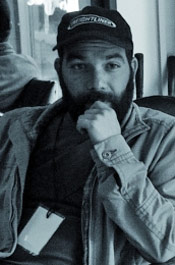Director, Screenplay
Gabriel Rojas Vera
Gabriel Rojas Vera was born in Bogotá on October 15, 1977. He graduated from the Emmanuel d’Alzon School in 1995 and went on to study film and television at the Universidad Nacional de Colombia, specializing in playwriting and screenwriting before graduating in 2005. His directorial debut, Karen llora en un bus, had its world premier on May 13, 2011 in the Forum section of the 2011 Berlin Film Festival, which in the words of the festival “focuses on young filmmakers and films that push the medium’s limits as well as its perception of itself… reflecting a desire for radical and impartial exploration of the grey area between fiction and documentary.”
In 2007, Rojas was employed as a screenwriter at the Higher Education Center for Cinematographic Production (CSPC) in Guadalajara, Mexico, where he also participated in the “Filming the Ineffable” Film Forum. He has directed actors in the short films Todas las gallinas eran sospechosas (now in post-production) and Minuto 200 (2011), and co-directed the documentary Falsos Positivos en Extradición (2010) with Frank Benítez. His company Cíclope Films develops feature and short film projects and music videos.
In 2005, he wrote the project for Karen llora en un bus, which was selected by the T y PA Foundation for the 12th Film Project Analysis workshop in Colon, Argentina. “Karen came about during a period when I had no car and was dependent on public transportation and subjected to the inevitable traffic jams that make bus travel in Bogotá, whether long or short, interminable. To pass the time I tried to imagine the lives of fellow passengers based on their facial characteristics and expressions, clothes, gestures and movements. I enjoyed making up stories about them, their conflicts, families, socio-economic situations and even political inclinations.”
In 2006, he was awarded an FDC script development grant and the following year participated in a screenwriting contest organized by Unión Latina and PROIMAGENES Colombia during the Cartagena International Film Festival. “One day a young girl sitting across the aisle from me caught my eye; she was looking out the window, off into the distance, as if lost in the endless dolly shot you get from a bus. She was undoubtedly not looking at the passing cityscape but was lost in her own thoughts and seemed to have completely blocked out the other passengers in much the same way an actor will forget about the imposing Cyclops that is the camera. The young girl was unable to contain her feelings and began to cry softly while the surrounding crowd watched her out of the corner of their eyes, somehow managing to magically command their respect. I wasn’t looking out of the corner of my eye; I looked shamelessly straight at her and was tempted at times to approach her and ask why she was crying but I was too shy and had to recur once again to my game of inventing her past on the cold computer screen.”
Karen llora en un bus was also awarded an FDC feature film production grant in
2007. “I was sure the young anonymous woman was crying over a break-up. At the time I was working on a synopsis for a short film about a housewife financially dependent on her husband, who decides to separate from him and start a new life. After finishing the first version of the screenplay I noticed I’d practically rewritten the second part of Ibsen’s “A Dollhouse”, which led me to a second argumentative question: What happened to Nora after she closed the door to her house and left her husband? With this new question in mind I developed the second version, which became the premise for all future rewrites. Nevertheless, I felt the character lacked… well, character; I imagined a combination of Nora Helmer and Ana Karenina: from Nora, the housewife who rebels and leaves her husband to become an autonomous woman; from Ana, the valor of seeking happiness outside the prejudices of a moralist, hypocritical society that underestimates women.”
Filming
Director
KAREN CRIES ON THE BUS (2011)
Screenplay
KAREN CRIES ON THE BUS (2011)






